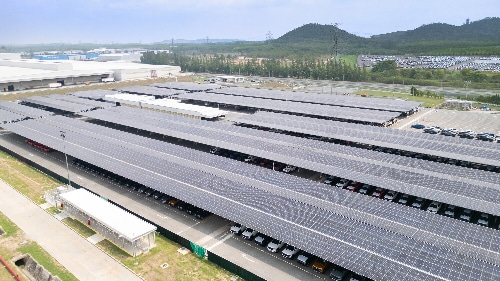
Ford has made its goals of carbon neutrality and sustainability widely known, and one of the company’s latest innovations in that regard is taking place at key Ranger and Everest production facilities in South Africa and Thailand. Here, solar canopy parking lots are allowing the facilities to capture a vital renewable energy source to help power the production of the cars of the future.
“Solar canopy carparks are an incredibly exciting opportunity for Ford as they allow us to make use of spaces that would otherwise have limited use,” said Andrea Cavallaro, director of operations, International Market Group, Ford.
“Car parks have incredible potential for photovoltaic systems, converting solar energy into electricity,” Cavallaro continued. “The advantage is that they provide shelter for finished vehicles from the rain and excessive heat while also providing power for nearby facilities.”
Ford’s Silverton Assembly Plant in Pretoria, South Africa is the home of a 13.5-megawatt solar carport with parking space for more than 3,500 vehicles. It was completed in 2022, and now provides 18% of the electricity needed to produce each Ranger vehicle on site. All told, this solar energy can power the production of over 20,800 Ranger vehicles each year.
At Ford Thailand Manufacturing, a recently-built 7.7-megawatt solar carport is now sheltering over 1,500 vehicles, the solar panels contributing to an annual reduction of more than 5,700 tons of carbon dioxide (CO2) emissions. In the production at the site of Ford’s Ranger and Ranger Raptor vehicles, the solar parking lot now provides up to 20% of necessary power. This is in addition to the 6-megawatt solar project the plant already has in operation, making AAT Ford’s largest user of solar energy in the region at 14 megawatts.
“At Ford, we’re focused on environmental quality; both in terms of what we build and how we build. We’ve continued to push ourselves to conserve water, reduce waste and transition to carbon-free electricity in manufacturing. Initiatives like solar canopy carparks and floating solar farms are an incredibly vital part of our Road to Better commitment, which helps build a more sustainable, inclusive and equitable transportation future,” said Cavallaro.
“That these systems can make use of otherwise inert space and contribute in a very real way to our production needs, while reducing our reliance on fossil fuels for energy, is an important contribution in our ongoing ambition to help build a better world."
Interested in learning more about Ford’s latest sustainability initiatives? You can continue to read more on our blog here.